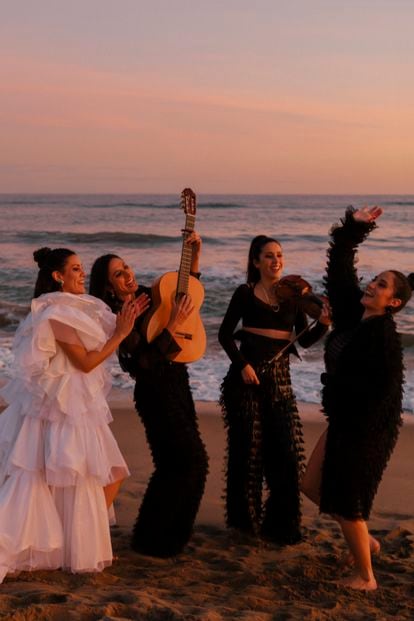Throughout her 18 years at the helm of Las Migas, Marta Robles has had time to learn a few essential lessons.
Especially a couple of them.
The first, that mistakes are better to make yourself, for that of finding the remedy and revulsive as soon as possible.
And the second, that if the slips and trips of destiny do not finish you, the bruises will end up making you stronger.
The group that many considered finished when its first vocalist, the illustrious and revered Sílvia Pérez Cruz, decided to fly as an artist in her own name, not only survived that desertion but lives now, coinciding with her coming of age, the most sweet of his career.
The reception of her recent fifth album, the radiant and proud
Libres
, endorses it.
And her debut in September on the Indian stage, as the greatest exponents of Spanish culture in women, encourages them for what is to come.
"Many nice things have happened to us, but also, of course, there has been room for a few shits," exclaims a loquacious and smiling Robles, a Sevillian woman about to turn 46, from her brief summer retreat in Matalascañas (Huelva).
The interview takes place by videoconference, each one in a different point of Spain.
She tells Robles that she never came to firmly weigh the dissolution of the project, but she admits that in 2019, as soon as she published her penultimate album,
Cuatro
, they bordered the precipice.
“We were wrong to record the LP with the singer Begoña Salazar.
We didn't get along, we rushed in a hurry, it was a very big blunder… And she left us in the middle of the tour”.
More information
Camarón's heritage has a woman's voice
Headless from one day to the next, Robles and her right arm, also guitarist Alicia Grillo, reviewed the agenda of possible candidates;
his particular “musical Tinder”, in his own definition.
And there they remembered a more than promising girl from Extremadura.
She responded to the name of Carolina Fernández, although everyone knew her in flamenco circles as La Chispa.
"My sister and I went to keep an eye on him that same morning at the April Fair, where he performed in a booth," Marta now reveals, amused.
“We knew that she lived in Mérida, that she was far from our headquarters, Barcelona, but she… we loved her.
I suggested that he join in, that we had the whole afternoon to rehearse at my house”.
Chispa herself, a 35-year-old from Mérida, intervenes in the conversation from Badajoz: “It was crazy, nonsense, but that train had to be taken.
And I said yes."
Two nights later, the current Las Migas line-up debuted at Prague's illustrious Reduta Jazz Club without anyone noticing that their singing voice had just landed.
Those uneven pre-pandemic ups and downs convinced Robles and the rest of the
crumbs
to definitively embrace self-management and thus avoid haste, pressure or more or less imperative suggestions.
Now they cook it and eat everything themselves;
even the processing of their candidacies for the next Latin Grammys or the management of social networks, where their recent radio versions in
Hoy por Hoy
de la SER of
El Quiero de una Morena
and
Antonia
―the two initial themes of the new work― have reached millionaire visits.
It is curious that the endorsement of popularity is reaching them precisely now, after an already long career, but those are the advantages of operating more as a group than as a sum of more or less illustrious names.
"We are original enough that there is no other similar band right now," argues guitarist Alicia Grillo from Barcelona (Peñarroya-Pueblonuevo, Córdoba, 33 years old), who has already been in the band for eight seasons.
“We have a roll like a camera quartet.
As a kid I was a classical music geek who later freaked out listening to Camarón's cassettes with my friends, and something of all that also comes together in our music”.
This is the story of Antonia, pirate of love 🏴☠️
That woman who left her heart to all the girls she found bitten 🫦💔 @LAS_MIGAS pic.twitter.com/7o27zV0gVe
– Today for Today (@HoyPorHoy) May 6, 2022
Marta Robles, Sílvia Pérez Cruz and Isabelle Laudenbach, classmates at the Higher School of Music of Catalonia, conspired in 2004 to form an exclusively female group, with flamenco roots but an eclectic vocation, permeable to vocal harmonies, Latin American influences and own compositions.
"We always had to be only women, yes or yes," confirms Marta.
“There are so many male-only groups that a counterweight was needed, a reference that would normalize the figure of the artist and serve as a reference for adolescent girls and girls who did not dare to dedicate themselves to this at all.”
Now there are more examples of female-only formations, but that was an audacity and a rarity, a small revolution.
“We came across festivals where they told us: 'Wow, how beautiful the bailaoras are.
When do your musicians arrive?'
Or with sound technicians who didn't believe we had higher degrees in classical guitar and didn't pay attention to our instructions”, reveals Alicia Grillo with a gesture of being fed up.
“But there are more and more of us.
Las Maruja Limón, who are five girls from Barcelona, were trained following our example”.
Even more canonical flamenco singers like María Terremoto, a Jerez-born gypsy cantaora, have confessed their devotion to them.
That empowerment and firmness in defending women in the forefront of art were decisive for the Spanish consul in India, Alfonso Pérez Hernández, to personally contact them a few months ago and offer them to debut in Dheli and Bombay the next September 19 and 21.
“We are immersed in a campaign to defend gender equality and the dissemination of the best expression of our culture.
Your work fits very well with these ideas”, he wrote to them.
They, used to an extensive international agenda (they have just completed their third tour of Albania and have a German recruitment office), could not believe it.
“It is a country with a very macho tradition, but it is also the land of [singer and sitarist] Anoushka Shankar.
We will understand each other well ”, ditch Robles.
In the end, the good reception of
Libres
, in which collaborators as heterogeneous as Estrella Morente, Tomatito or María Peláe come together, endorses the viability of a project that has never been exempt from difficulties.
Pérez Cruz's own slam, after seven years of shared history, left wounds that still have not healed: many mutual friends remain, but the relationship between both parties is icy.
Less traumatic was the departure of the second vocalist, Alba Carmona, who now also exhibits a solid solo discography.
And the four current
crumbs
have received with euphoria that
Antonia
, the story of the crush between that "pirate of love" and a "brunette from the port", is turning them into a benchmark for the LGTBI community.
“The original protagonist of the story was a flirtatious pimp”, reveals Marta Robles, “but suddenly we realized that everything would make much more sense from a strictly feminine perspective.
We have always wanted to give a voice to women fighters, and in that area of individual rights there is still much to fight for”.
Another promotional image of the quartet, in 2022.
In this long journey of ups and downs with a happy ending, the current members of Las Migas only have one major internal debate to resolve.
And it's tricky.
Marta Robles, Alicia Grillo and Carolina Fernández recognize that their commitment to art leads them to "put this work before the rest of the ingredients" of their lives.
“It is a conscious resignation.
The happiness of making music around the world cannot be compared to anything”, argues Grillo.
None of the three have children and the only one who is a mother, the violinist Roser Loscos, will leave the band in September (she will be replaced by Laura Pacios) in order to “reorganize” her day-to-day.
Chance?
―There are many mothers in flamenco.
Each case is a world, but it has nothing to do with it ―argues La Chispa.
"If the woman and the man are artists, I find it very naïve to think that she is the one who says: come on, see you later, I'm going on tour and you stay with the child," objects Robles.
It gives me that there is still no real equality with parenting.
It is a problem that we have not yet overcome in our sector.
A good reason, one more, for Las Migas to continue raising their voices and fulfilling years on stage.


/cloudfront-eu-central-1.images.arcpublishing.com/prisa/XSO4XYYIOJGKNPSUBHUGGDBMFU.jpg)






